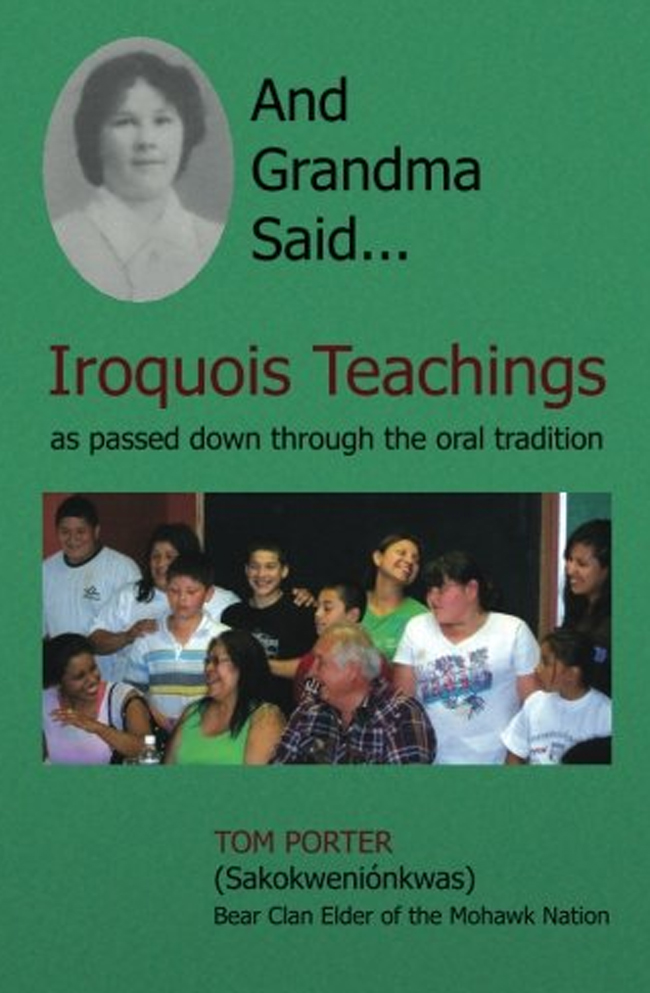Book Review: ‘And Grandma Said…’
 Reviewed by Shirley Honyust/ Yenatli:yo
Reviewed by Shirley Honyust/ Yenatli:yo
Iroquois Teachings as passed down through the oral tradition, authored by Tom Porter (Sakokwenionkwas) Bear Clan Elder of the Mohawk Nation, and winner of the Wassaja Award for Journalism Excellence by the Native American Journalists Association 1994.
The reputation of this book comes far ahead of its availability, as it was difficult to find on the bookshelves and the catalogue of the London Public Library or any of its branches. Finally Tom Porter visited N`Amerind Friendship Centre in London and brought several copies of the book with him.
Putting the teachings into written form is for many traditional teachers the ultimate taboo, and Tom describes his mission to write a book as coming about as the result of a dream. In the dream, his grandmother told him to write down everything that she had taught him. Tom said that everything that he talked about in his presentations, he had learned directly or indirectly from her. All he needed to do was get it written down on paper. So, these are one person’s remembrances and interpretations of the teachings given to him: Tom Porter. He gives another rationalization of why he shares the teachings in his book. In his chapter on colonialism, the influence of Christianity and of intellectuals in the world of academia.
Tom says, “It’s like we don’t have a world of our own. We don’t have any way to have our very own history. ‘Cause we were taught that by the missionaries. We were taught that by the school or somebody, see? So every time we find something that’s good or whatever, it’s “Oh, we taught you that.”
Early in the book Tom refers to the words his grandmother said in his dream, “And she said to me, ‘what I’d like you to do is to try sit down and remember everything that Grandma said, that all your grandmas said, and your elders. What I want you to do is start writing it down. Write it down on the book or paper. Whatever we told you over the years since you were born—our beliefs and our way of looking at the world, our way of walking in the world—write it down. And put it together.’”(Page 3)
The book was transcribed, verbatim for the most part, by Lesley Forrester. In editing the book, Forrester’s goal was to maintain Tom’s “voice”, the unique flavor of his way of speaking without losing the readability of the material. Examples that Forrester gives of his struggle were that he noticed Tom’s tendency to put the adverb at the beginning of the sentence and the subject at the end. Forrester makes himself accountable in the final words of his forward, “If there are any omissions, inaccuracies or distortions, I take full responsibility for them. Edited and transcribed in the Creator’s time.”
Forrester explains that when he first met Tom he already had many friends and acquaintances in the Mohawk territory of Tyendinega, and he became profoundly influenced by Tom through hearing him speak. Tom’s desires and dreams became a profound influence on him, so, he followed Tom around for two years and gave him a body mike recording him when he was allowed. Lesley Forrester became the instrument that Tom chose to use in order to share his stories with those who hungered for them. Tom’s book includes chapters on creation stories, clans, rituals, games, weddings, funerals, pregnancy, childbirth and child-rearing methods according to Mohawk tradition. It is well written and flows nicely, making it an awesome and engaging read, from cover to cover, or delving right in and opening a page anywhere in the book.
What this book does not do is put traditional teachings into an English version of spiritual knowledge and perception. It is not a how-to Indian book for wanna-bes.
“And Grandma Said…” by Tom Porter (Sakakwenionkwas), 2008 ISBN 0-275-98384-6.


